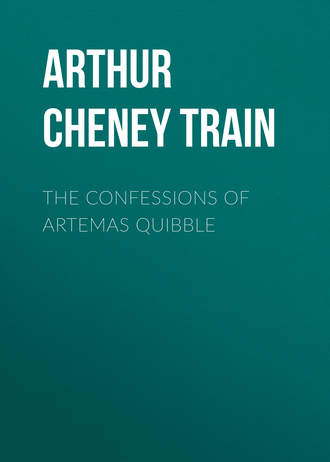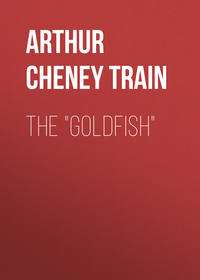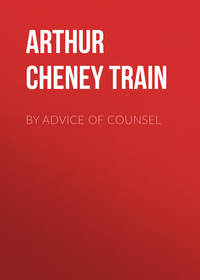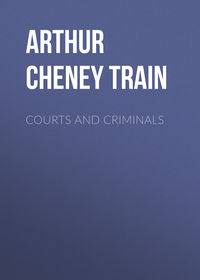 полная версия
полная версияThe Confessions of Artemas Quibble
Our clients consisted, for the most part, of three clearly defined classes of persons: Criminals, their victims, and persons involved in marital or quasi-marital difficulties. These last furnished by far the most interesting quota of our business, and, did not professional confidence seal my lips, I could recount numerous entertaining anecdotes concerning some of what are usually regarded as New York's most respectable, not to say straight-laced, households. A family skeleton is the criminal lawyer's strongest ally. Once you can locate him and drag him forth you have but to rattle his bones ever so little and the paternal bank account is at your mercy. New York is prolific of skeletons of this generic character, and Gottlieb had a magnificent collection. When naught else was doing we used to stir them up and revive business. Over this feature of the firm's activities I feel obliged, however, from a natural feeling of delicacy, to draw a veil. Our function usually consisted in offering to see to it that a certain proposed action, based on certain injudicious letters, should be discontinued upon the payment of a certain specified sum of money. These sums ranged in amount from five to twenty thousand dollars, of which we retained only one-half. I understand that some lawyers make more than this percentage, but for such I have only contempt. A member of a learned and honorable profession should be scrupulous in his conduct, and to keep for one's self more than half the money recovered for a client seems to me to be bordering on the unethical. But perhaps I am hypersqueamish.
Of course we had a great deal of the ordinary "knock-down-and-drag- out" variety of assault, robbery, theft, and homicide cases. Most of these our clerks attended to, but the murder cases Gottlieb defended in person, and in this he was so singularly successful that there was hardly a celebrated trial in which he was not retained in some capacity or other. For he was an adept in all those little arts that make a jury feel well disposed toward a lawyer, and as a word artist he was unsurpassed. Gottlieb could, I believe, have wrung tears from a lump of pig iron, and his own capacity to open the floodgates of emotion was phenomenal. He had that rare and priceless gift shared by some members of the theatrical profession of being able to shed real tears at will. His sobs and groans were truly heart-rending. This, as might be expected, rendered him peculiarly telling in his appeals to the jury, and he could frequently set the entire panel snivelling and wiping their eyes as he pictured the deserted home, the grief-stricken wife, and the starving children of the man whom they were asked to convict. These unfortunate wives and children were an important scenic feature in our defence, and if the prisoner was unmarried Gottlieb had little difficulty in supplying the omission due to such improvidence. Some buxom young woman with a child at the breast and another toddling by her side could generally be induced to come to court for a few hours for as many dollars. They were always seated beside the prisoner, but Gottlieb was scrupulous to avoid any statement that they belonged to the client. If the jury chose to infer as much that was not our fault. It was magnificent to hear (from the wings) Gottlieb sum up a case, his hand, in which was concealed a pin, caressing the youngest little one.
"Think, gentlemen, of the responsibility that rests upon you in rendering this woman a widow and depriving this poor innocent babe of a father's protecting love!"
Here Gottlieb would hiccough out a sob, sprinkle a few tears upon the counsel table, and gently thrust the pin into the infant's anatomy. Sob from Gottlieb—opportune wail from the baby. Verdict —not guilty.
There was a certain class of confidence men for whom we soon became the regular attorneys. They were a perennial source of delight as well as profit, and much of my time was given up to the drafting of circulars and advertisements for the sale of stock in such form that, whereas they contained no actual misstatement of an existing fact, they nevertheless were calculated to stimulate in the most casual reader an irresistible desire to sell all that he had and invest therein.
Originally the dealers in valueless securities did not take the trouble to purchase any properties but merely sold their stock and decamped with the proceeds. Of course such conduct was most ill- advised and unnecessary. It was obviously criminal to sell stock in a concern that has no existence, and several of my clients having been convicted of grand larceny, for this reason I took it upon myself to advise the others actually to purchase lands, mines, or other property and issue their stock against it. In this way their business became absolutely legitimate—as strictly honest and within the law as any of the stock-jobbing concerns of the financial district. To be sure, the mine need not be more than the mere beginning of a shaft, if even that; the oil-well might have ceased to flow; the timber land might be only an acre or so in extent; but at any rate they existed. Their value was immaterial, since the intending purchaser was not informed in the advertisement as to the amount of gold, silver, or copper mined in any specific period, the number of gallons of oil per minute that flowed from the well, or the precise locality of the timber forests, but merely as to the glorious future in store for all who subscribed for the stock.
This vital distinction has always existed in civil as well as criminal law between what is fraud and what is legitimate encouragement to the buyer. To tell the prospective vendee of your old gray mare that she is the finest horse in the county is not fraud even if she is the veriest scarecrow, for it merely represents your opinion —perhaps colored in part by your desire to sell—and is not a matter of demonstrable fact. To assure him, however, that she has never run away, had blind staggers, or spring halt, when these assertions are not true, is "a false statement as to a past or existing fact," and as such constitutes a fraud—if he buys your horse.
Now, it frequently has happened in my experience that gentlemen desiring to find purchasers for securities or property of little value have so carelessly mingled statements of fact with opinions, laudations, and prophecies as to their goods, that juries have said that they were guilty of fraud in so doing. Thus the lawyer becomes at every turn indispensable to the business man. The following circular was drawn up for one of our clients and is an excellent example of a perfectly harmless and legal advertisement that might easily become fraudulent. We will suppose that the corporation owned one-quarter of an acre of wood lot about ten miles from a region where copper was being mined.
"SAWHIDE COPPERS "YOUR LAST CHANCE TO BUY THIS STOCK AT PRESENT FIGURES! "The company's lands are located near the heart of the copper district, not far from properties now paying from forty to sixty per cent. a year. There is no reason in the world why Sawhide should not do as well if not better. With immense quantities of ore just beneath the surface, when our new smelter is completed Sawhide will undoubtedly prove one of the best dividend payers in the country! As the Buggenheims and other well-known financiers are largely interested in the stock, it is only a question of time before it will be marked up out of sight. The properties have great surface value and are rolling in timber and mineral wealth."
This is a fair example of a perfectly safe variety of advertisement that does not commit the author to anything. As long as there is a piece of land somewhere and an actual incorporated company the stock of which, however valueless, is being offered for sale, the mere fact that the writer indulges himself in rosy prophecies does not endanger him so far as the criminal law is concerned. It is only when he foolishly—and usually quite as unconsciously—makes some definite allegation, such as, for instance, that the company "owns six hundred acres of fully developed mining property," or has "a smelter in actual operation on the ground," or "has earned sixty-five per cent. on its capital in the past year," that the financier runs the slightest risk. It may be that a purchaser would find it so difficult to prove the falsity of any of the statements upon which he had relied in purchasing the stock that the vendor would practically be immune, but in these days of muck- raking and of an hysterical public conscience prosecutors sometimes go to the most absurd lengths and spend ridiculous sums of money out of the county treasuries to send promoters to jail.
They are apt to have a hard time of it, however. I recall one scheme in which a client of mine was interested, involving the floatation of about a hundred thousand dollars' worth of railroad stock. The circulars, printed by a famous engraver and stationer, were twenty pages in length and contained the minutest description of the company's board of directors, rolling stock, capitalization, bond issues, interests in other railroads, government grants of land, and the like. They were embellished with beautiful photographs of deep cuts, suspension-bridges, snow-sheds, railroad-yards, and round-houses. The promoter did a mail-order business and sold the stock by the bagful to elevator men, trained nurses, policemen, porters, clerks, and servant girls.
After he had salted away about forty thousand dollars some of the purchasers began to get anxious about their dividends. None were forthcoming, and as the promoter was inclined to be indefinite as to future prospects he was presently arrested. But when the case came to trial I pointed out a fact that, strange as it may seem, practically no one of the multitude of stockholders had previously noticed, namely, that the circulars made no actual statement as to where the railroad was located. By inference it might well have been supposed to be somewhere in Canada, but there was no such fact clearly alleged. Of course it was impossible for the prosecutor to prove that my client did not own a railroad somewhere in the world and the indictment had to be dismissed. Negations are extremely hard to establish, and therein lies the promoter's safety. If he sticks to generalizations, no matter how they glitter, he is immune. Had my railroad promoter inserted a single word descriptive of the location of his franchise or his terminals he would now be in Sing Sing instead of owning a steam yacht and spending his winters in Florida.
From the foregoing the reader will observe that the first-class criminal lawyer by no means devotes his time to defending mere burglars and "strong-arm" men. The élite of the profession do as gilt-edged an office practice as the most dignified corporation attorneys. Indeed, in many respects their work is strictly identical.
CHAPTER V
The firm of Gottlieb & Quibble had not been long established before —quite by chance—a new vista of opportunity opened before us. My partner had a wretched client who, not unlike many others, would go to more pains and trouble to steal a dollar than it would have taken him to earn twenty. This, I have noticed, is a general peculiarity of lawbreakers. The man's name was McDuff and my partner had defended him on several occasions and had got him off, with the result that he was always hanging about the office and asking if this and that were "within the law." One fine day he was arrested on the charge of having obtained money by false premises in an unique manner.
It appeared that he had learned through a certain bar-tender that one Jones, a patron of the place, had but recently come into a legacy of a couple of hundred dollars and, in connection therewith, had imbibed so freely that he had become involved in a fist fight with a gentleman by the name of Holahan and had done the latter considerable facial damage. McDuff pondered upon these facts for some time over his beer and then set out to find Jones—not a difficult task, as the legatee was making a round of all the near- by saloons and endeavoring to drink up his good fortune as rapidly as possible. Overtaking him in a side street McDuff grasped him roughly by the shoulder.
"Look here, Jones," says he, pretending to be an officer; "I have a warrant for your arrest for committing a battery upon Thomas Holahan. You must come along with me to the station-house."
"What! For me!" cries Jones in an agony of dismay. "Sure, I did nothing to the man. You're not going to lock me up for that!"
"It's my unpleasant duty," answers McDuff. "An officer has no choice in the matter. You must step along."
"Come, come!" replies Jones, pulling his money from his pocket.
"Here's a hundred and fifty dollars. Say you couldn't find me!"
"I would be taking a great risk," responds the supposed officer.
"Have you no more than that?"
"I have my gold watch and chain," returned Jones. "You can have them and welcome—only let me go!"
The bargain was struck then and there and the transfer from Jones' pockets to those of McDuff effected. Unfortunately, however, Jones next day discovered that Holahan harbored no ill-will against him and that the supposed officer was nothing of the kind. Rising in his wrath, he in turn procured a warrant for McDuff and caused his arrest and indictment. The trial came off and despite Gottlieb's best efforts his client was convicted by the jury of stealing Jones' watch, chain, and money by falsely representing himself to be an officer of the law. The case went on appeal to the Supreme Court, which affirmed the conviction, and there seemed no escape for McDuff from a term in prison.
One evening Gottlieb and I got talking about the case among other things.
"How is it," said I, "that the criminal law will step in and give a man back his money when, under precisely the same circumstances, the civil law will let him whistle?"
"What mean you by that?" asked my partner.
"Why," answered I, "the civil law will not settle disputes between thieves, it will not enforce an equitable division of stolen property, and it will not compel rogues to keep a dishonest contract between themselves. Now this fellow, Jones, it seems to me, was almost as bad as your friend McDuff. He tried to induce a man he thought was a sworn officer of the law to violate his oath and disregard his duty. Why should the criminal law do anything for him? Why should it hand him back his money as if he were an innocent and honest man?"
"It is an ingenious argument," replied Gottlieb, scratching his ear; "and yet it is poppycock for all that. The criminal law is to punish criminals. According to your reasoning, two wrongs would make a right and two thieves one honest man. Would you let McDuff go unpunished simply because he was clever enough to induce Jones to try to break the law as well as himself? Why, any judge would laugh you out of court on such a proposition."
"But," I retorted, "surely, if I gave you a hundred dollars for the purpose of bribing a judge and you failed to accomplish your purpose, no court would assist me to recover the money. 'Twould be against public policy and contra bonos mores."
"Even so," answered my partner, "would it not be more contra bonos mores to let a thief go unpunished, once he had been arrested? Take my word, Quib, there's nothing in it," insisted Gottlieb warmly. "For instance, there is the crime against usury—a very foolish law to be sure, but there it is. No one can commit usury unless some one else participates in the offense by paying the unlawful interest; but the usurer does not escape on that account. Why, then, should the false pretender in our case?"
"I admit the force of your analogy," said I, "and I could easily suggest others myself. Bribery, for instance; extortion and many other offences, where the law does not refrain from punishing the one because the other is equally guilty. But the cases differ in that, in bribery, the briber is seeking to influence the acts of an official; and, in extortion, the law imputes an element of force which is supposed to overcome the will of the person paying the money. I am not so clear on your usury. Still, I believe there is a fighting chance to win the case on my theory."
"If you think so," grumbled Gottlieb, "you had better argue it yourself before the Court of Appeals."
"Very well," said I. "Nothing will give me greater pleasure."
It was with some trepidation, however, that I went to Albany to argue, before so august a body of judges, a proposition of law that had in reality so little to commend it; particularly as I was opposed in person by the district attorney of New York County—a man of great learning and power of sarcasm. However, I found the Court of Appeals much interested in my argument and had the pleasure of hearing them put many puzzling questions to my opponent, in answering which he was not always altogether successful.
Pending the opinion of the Court, which was not handed down for several months, an incident occurred in our practice that may serve to amuse the reader if not to illustrate the dangers of ignorance. We were engaged in a litigation in the United States District Court, where the subpoenas for the witnesses are issued by the clerk to the deputy marshals for service. Our opponent in the case was a testy old member of the bar over sixty years of age and of the very highest respectability and standing, who had several times refused elevation to the bench and was regarded as the personification of dignity and learning. Unfortunately his appearance belied his position, for he was almost totally bald and his face was as weazened and wrinkled as that of a monkey.
It so happened that we desired to have in court the following day certain papers that were in his possession; and, in order that we might be in a position to introduce copies of them in case he failed to produce the originals, we secured what is called a duces tecum subpoena for him—that is to say, a subpoena directing him to bring with him—duces tecum—"bring with you"—the papers in question. There had recently been appointed as a deputy marshal a very honest and enthusiastic, but exceedingly ignorant Irishman named Hennessey, who, prior to his advent into officialdom, had been employed at heaving coal at a dollar and eighty cents a day. The clerk called him into his office and handed to him our subpoena.
"Mike," he said, "here is a subpoena for Winthrop Van Rennsellaer" —our worthy opponent. "It is a duces tecum. Understand?"
"Shure, I do!" answered Mike, wiping his mouth with the back of his hand and taking the paper; for, though he had no idea of what duces tecum meant, he had no intention of disclosing the fact.
"It's important," continued the clerk. "Be sure and attend to the matter at once."
"Lave that to me!" Mike assured him.
"Don't forget that it's a duces tecum," admonished the clerk as
Mike passed out of the door.
"Not on yer life!" replied the newly appointed deputy.
Outside, he found a fellow deputy, also newly appointed.
"Pat," said Mike, holding out the subpoena, "phat is the meanin' o' thim two wurrds?"
His friend carefully examined the paper.
"'Duces tecum'," he repeated thoughtfully. "'Dooces taycum.' They be Latin words meanin' 'take him alive or dead.'"
"Thanks," said Mike. "Trust me!"
And he started forthwith for Wall Street, where Mr. Winthrop Van Rennsellaer's office was located. Having ascertained by inquiry that his quarry was in, Mike pushed by the clerks and scriveners in the outer offices and armed with the majesty of the law, boldly forced his way into the lawyer's sanctum. Marching up to him, he demanded in a loud voice:
"Are you Van Rennsellaer?"
The lawyer, exceedingly astonished, replied, with what dignity he was able to assume under the circumstances;
"I am Mister Winthrop Van Rennsellaer."
"Come wid me!" ordered Mike.
"I shall do nothing of the kind!" retorted the lawyer, getting red in the face.
"Y' won't, eh?" exclaimed the deputy; and, grasping Mr. Winthrop Van Rennsellaer by his linen collar, he yanked him out of his chair and, to the horror of the servile supernumeraries in the lawyer's employ, dragged that eminent member of the bar through his own offices, down the stairs, and into the street.
The lawyer protested loudly at the indignities to which he was being subjected and a large crowd gathered, which for the time being blocked Broadway. Mike, confident that he had the authority of the United States Government behind him, exhibited his badge, called upon the police to assist him in the exercise of his duty and proceeded triumphantly to march Mr. Winthrop Van Rennsellaer, hatless, up the street at the head of a large and enthusiastic procession of interested citizens. From time to time Mike would turn and call upon the crowd to disperse, at the same time announcing in a loud voice that he had arrested his prisoner by an order of the Government to take him alive or dead.
By this time the lawyer's little round head was glowing a bright red and his legs almost refused to carry him. Once they had arrived at the Post-office Building the mistake was quickly discovered and Mr. Van Rennsellaer was set at liberty; but each and every United States judge had to descend in his robes from the bench and implore his pardon before the furious little lawyer would consent to call a cab and return to his office.
I understand that he always believed that the whole thing was a trick of Gottlieb's to humiliate him; and, indeed, some members of the bar have suspected me of the same thing—entirely without justification, of course. During the rest of his exceedingly distinguished career one had only to mention the words duces tecum in the presence of Mr. Winthrop Van Rennsellaer to deprive him instantly of his composure; in fact, for a long time he abandoned appearing in court and contented himself with nursing his dignity in his office. I should add that the incident so affected his confidence the next day in court that we won our case without difficulty.
But to return to the unfortunate McDuff. To my great astonishment and still more so to that of my partner the Court of Appeals handed down an opinion sustaining my contention and holding his client's conviction to be illegal. That night Gottlieb and I, sitting in his office, shook our sides with laughter at the idea of having hoodwinked the greatest court in the State into a solemn opinion that a rogue should not be punished if at the same time he could persuade his victim to try to be a rogue also! But there it was in cold print. They had followed my reasoning absolutely and even adopted as their own some of the language used in my brief. Does any one of my readers doubt me, let him read the report of a like case in the forty-sixth volume of the reports of the Court of Appeals of New York, at page four hundred and seventy.
Said the Court: "The prosecutor"—Jones—"parted with his property as an inducement to a supposed officer to violate the law and his duties; and if in attempting to do this he has been defrauded the law will not punish his confederate, although such confederate may have been instrumental in inducing the commission of the offence. Neither the law nor public policy designs the protection of rogues in their dealings with each other, or to insure fair dealing and truthfulness, as between each other, in their dishonest practices." (This sentence had been in my brief.) "The design of the law is to protect those who, for some honest purpose, are induced upon false and fraudulent representations to give credit or part with their property to another, and not to protect those who, for unworthy or illegal purposes, part with their goods."
"Why, Quib," quoth Gottlieb, "you are the discoverer of a new legal principle. You will inaugurate a new field of human activity. Generations yet unborn will profit by your ingenuity. From now on every rascal in the land will set his wits to work trying to bring his schemes within the scope of this beneficent opinion."
"Indeed," I replied, "however fine it may be for McDuff, I can easily see that I have unloosed as many troubles as ever flew out of Pandora's Box."
"Yes—but to our profit," he retorted, with a grin. "Don't forget that. The inventors will all come flocking straight to us to get them out of their difficulties—you may be sure of it!"





